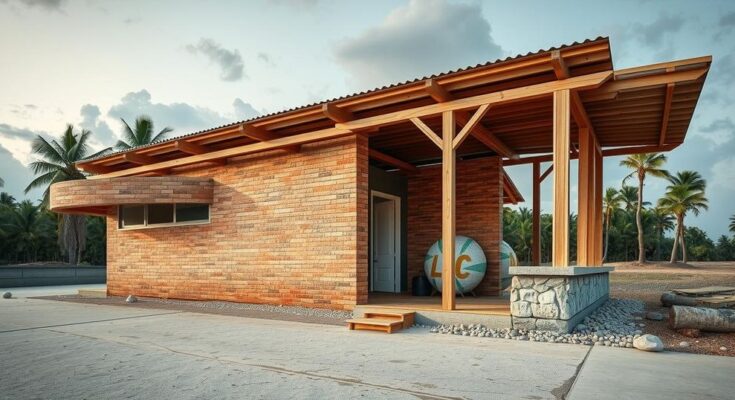Mozambique has begun constructing durable homes for victims of Cyclone Chido after the storm caused extensive damage, resulting in at least 70 deaths and hundreds of injuries. The government is prioritizing resilient materials for housing and is working alongside international partners for aid. Ongoing assessments suggest that the disaster has impacted over 174,000 people, exacerbating the risks of a cholera outbreak in the region.
This week, Mozambique commenced the construction of housing for the victims of Cyclone Chido, which devastated three northern regions of the country on Sunday, resulting in a reported 70 fatalities and 600 injuries. Minister of Trade and Industry, Silvino Moreno, emphasized that the government is prioritizing the provision of aid and transforming the affected areas by utilizing resilient construction materials to prevent future destruction from similar weather events.
Moreno acknowledged that nearly all homes in the cyclone-affected areas were built with mud and reeds, materials insufficient to withstand such a powerful storm.
He highlighted the need for improved training in construction techniques to ensure more durable housing solutions in the future.
The cyclone’s impact had been significant prior to reaching Mozambique, having resulted in fatalities and extensive infrastructure damage in Mayotte, which is a group of French islands. In southern Malawi, severe winds and rainfall from the storm further exacerbated the destruction, impacting countless families.
According to Mozambique’s meteorology agency, the nation should anticipate additional storms over the forthcoming three months of the rainy season, prompting calls for enhanced preparedness measures. UNICEF indicated that at least 174,000 individuals have been affected by the cyclone, with ongoing assessments likely to reveal an even greater number. The cyclone not only destroyed homes but also devastated educational facilities and health centers, further complicating recovery efforts in an already challenging environment.
Michael Chimedza, head of UNICEF’s field office in Zambezia province, stated the organization has mobilized resources to assist 50,000 people and has secured funding for local level response training. The cyclone notably traversed Nampula, Cabo Delgado, and Niassa provinces, leaving over 25,000 families without electricity and damaging vital infrastructure, which includes health units, roads, and water supplies. Furthermore, the recent devastation raises fears of a worsening cholera outbreak in a region that is already grappling with this public health crisis.
In addition to immediate aid and future housing construction, the government and humanitarian organizations are working together to mitigate the long-term impact of such disastrous weather events on the vulnerable populations.
The article addresses the immediate actions taken by the government of Mozambique in response to the devastation caused by Cyclone Chido, which significantly impacted several northern regions of the country. This cyclone left a trail of destruction, highlighting the fragility of infrastructure and housing in areas prone to such natural disasters. Furthermore, it underscores the need for resilient building practices and preparedness measures for future storms, especially considering the ongoing cholera outbreak in the region.
In summary, Mozambique is actively engaging in recovery efforts following Cyclone Chido, which resulted in substantial loss of life and infrastructure. The government is prioritizing the construction of resilient homes to ensure better protection against future storms and provides immediate assistance to those affected. With continued support from international partners and local initiatives, the focus on enhancing construction standards and emergency preparedness might significantly improve the resilience of affected communities.
Original Source: www.voanews.com




